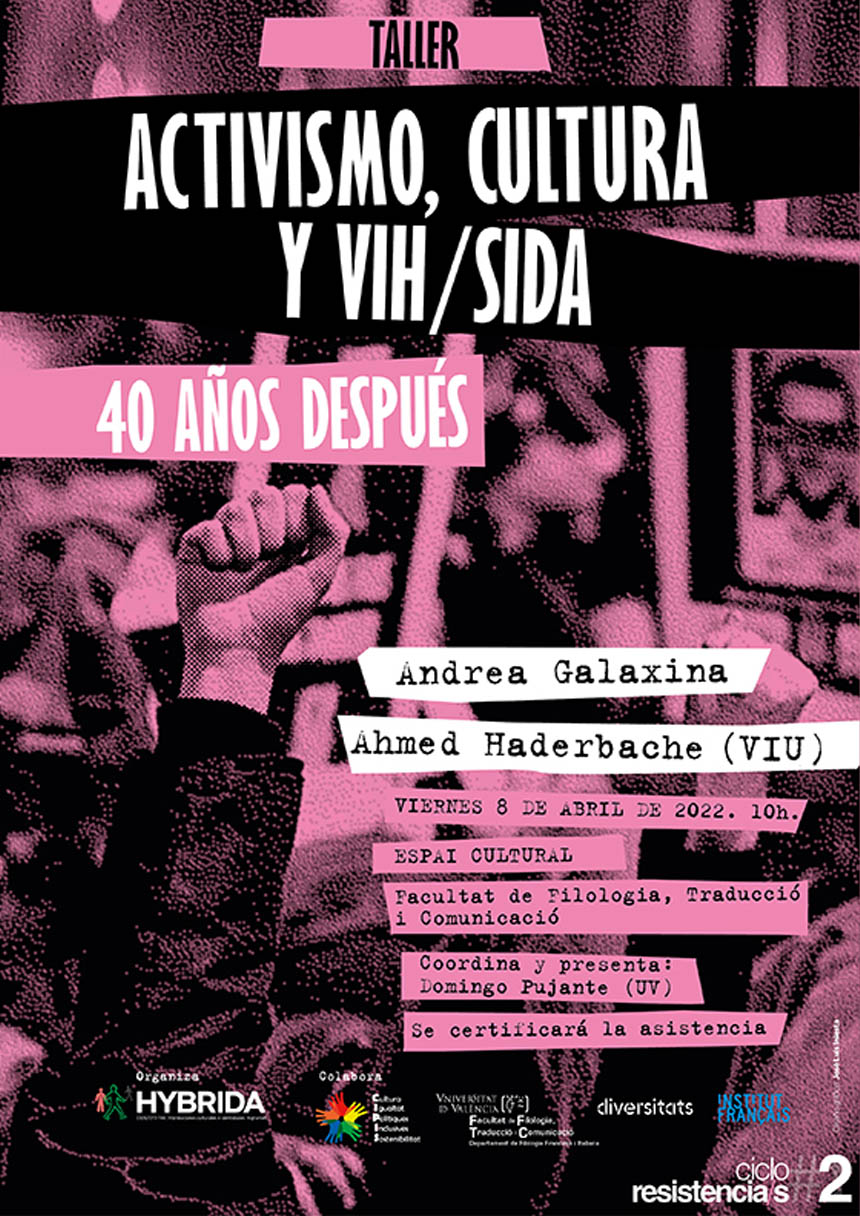
Andrea Galaxina and Ahmed Haderbache (VIU) will lead this series on Friday 8 April at 10:00 in the Espai Cultural of the Faculty of Language Studies, Translation and Communication.
- Organised by: Research Group GIUV2013-144: HYBRIDA
- With the collaboration of: CIPIS / Department of French and Italian / Diversitats / Institut Français
- Coordinated and presented by: Domingo Pujante (UV)
The Research Group GIUV2013-144 HYBRIDA (Cultural Hybridisations and Migrant Identities) continues its RESISTANCE/S series with this second instalment of 2022. Andrea Galaxina and Ahmed Haderbache will conduct a workshop entitled ‘Activism, culture and HIV/AIDS. 40 years later’. This activity will take place in the Espai Cultural, as part of the Cultural Week of the Faculty of Language Studies, Translation and Communication. It is sponsored by the Office of the Vice-Dean for Culture, Equality, Inclusive Policies and Sustainability (CIPIS) and has the support of the Department of French and Italian, the Initiative for Equality in Diversity (Diversitats) and the Institut Français.
When the first cases of AIDS emerged in the early 1980s, some people affected and future activists realised that the emerging epidemic was more than a public health problem. The political, social and economic dimensions of the virus made it a subject of attention and representation in a number of cultural works at the end of the century. Some are deeply political and contentious, while others are more comfortable, and some perpetuate prejudices and taboos.
In the first part of the workshop, Andrea Galaxina will analyse the impact of the virus on cultural productions, focusing especially on visual arts. In addition, she will examine the most outstanding and interesting examples and the mechanisms and modes of representation of the epidemic and those affected by it in culture. The discussion brings the reflection up to the present day.
In the second part, Ahmed Haderbache will focus on the repercussions of AIDS in the political, associative and cultural spheres in France and Spain during the 1980s and 1990s, focusing on homophobic and serophobic discourses in French and Spanish politics. The political campaigns of anti-AIDS associations such as Act Up-Paris will be analysed and an overview of AIDS writing in France will be presented. To conclude, he will reflect on the repercussions of these social-political actions and the relevance of these cultural productions 40 years after the emergence of AIDS.
Andrea Galaxina holds an undergraduate degree in Art History (University of Oviedo), a Master’s degree in Teacher Training (University of Oviedo) and a Master’s degree in Contemporary Art History and Visual Culture (Complutense University of Madrid–Autonomous University of Madrid–Museo Reina Sofía). She has developed her professional career in the fields of teaching, publishing and culture. Her field of expertise is in the cultural productions of the counterculture and especially on the world of the fanzine. She has created and directs the fanzine editorial Bombas para Desayunar and the contemporary art editorial El primer grito. She has collaborated in different projects with institutions like the MACBA, the Reina Sofía museum, the CA2M, the Fundación Telefónica or Tabakalera. She writes about contemporary art in Exit and La Marea. She has recently published the book Nadie miraba hacia aquí. Un ensayo sobre arte y VIH/sida (2022).
Ahmed Haderbache is a secondary school teacher and French language lecturer at the International University of Valencia (VIU). He is currently working on a doctoral thesis on the work of Guillaume Dustan. His research has led to several scientific publications, and focuses on the representations of homosexuality and HIV/AIDS in French literary and cinematic discourse, especially in Dustan’s work. In collaboration with Ana Monleón, he coordinated the colloquium and subsequent volume Sida y cultura (Universitat de València, 1997), a pioneering work in Spain, and recently, together with Didier Lestrade, the monograph entitled SIDA/S. 40 ANS of HYBRIDA (December 2021).
The workshop is free, open and participative, and will last for two hours. Certification will be provided upon request.








